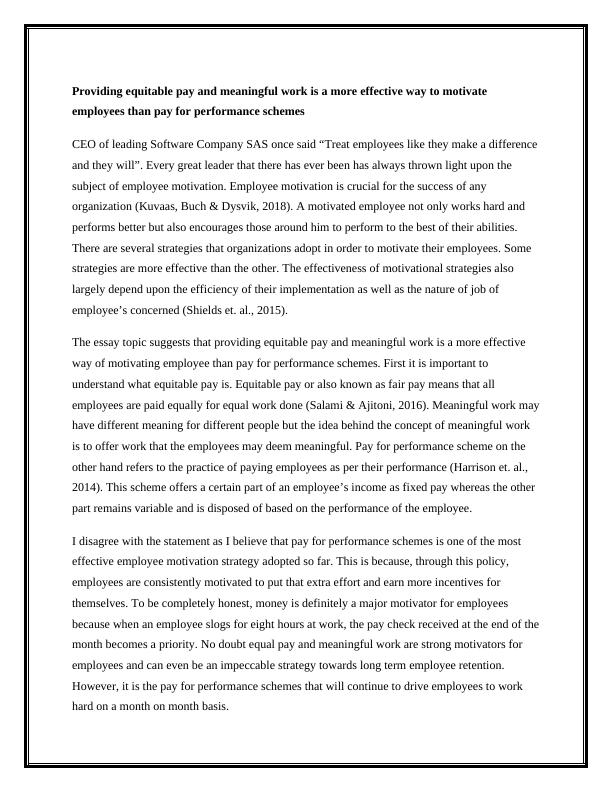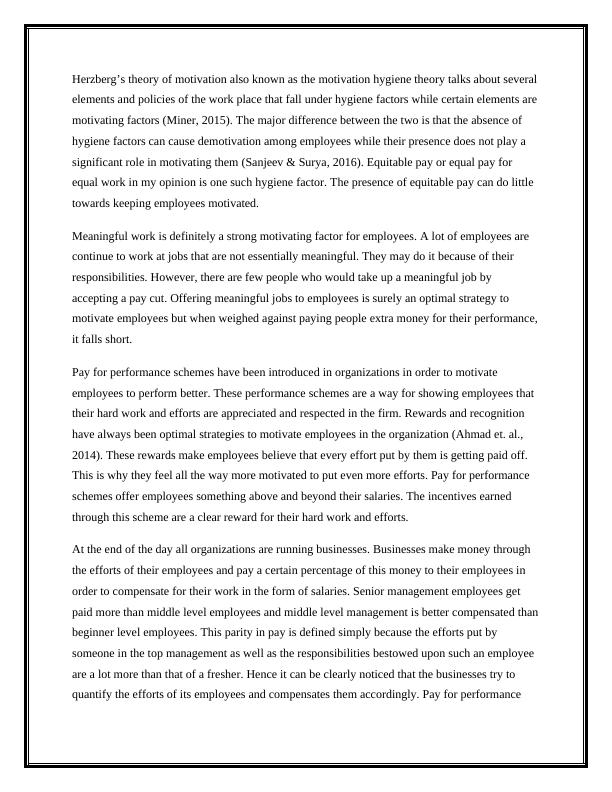Effectiveness of Pay for Performance Schemes in Employee Motivation
Added on 2023-06-04
7 Pages2075 Words490 Views
Managing people
ESSAY
ESSAY

Providing equitable pay and meaningful work is a more effective way to motivate
employees than pay for performance schemes
CEO of leading Software Company SAS once said “Treat employees like they make a difference
and they will”. Every great leader that there has ever been has always thrown light upon the
subject of employee motivation. Employee motivation is crucial for the success of any
organization (Kuvaas, Buch & Dysvik, 2018). A motivated employee not only works hard and
performs better but also encourages those around him to perform to the best of their abilities.
There are several strategies that organizations adopt in order to motivate their employees. Some
strategies are more effective than the other. The effectiveness of motivational strategies also
largely depend upon the efficiency of their implementation as well as the nature of job of
employee’s concerned (Shields et. al., 2015).
The essay topic suggests that providing equitable pay and meaningful work is a more effective
way of motivating employee than pay for performance schemes. First it is important to
understand what equitable pay is. Equitable pay or also known as fair pay means that all
employees are paid equally for equal work done (Salami & Ajitoni, 2016). Meaningful work may
have different meaning for different people but the idea behind the concept of meaningful work
is to offer work that the employees may deem meaningful. Pay for performance scheme on the
other hand refers to the practice of paying employees as per their performance (Harrison et. al.,
2014). This scheme offers a certain part of an employee’s income as fixed pay whereas the other
part remains variable and is disposed of based on the performance of the employee.
I disagree with the statement as I believe that pay for performance schemes is one of the most
effective employee motivation strategy adopted so far. This is because, through this policy,
employees are consistently motivated to put that extra effort and earn more incentives for
themselves. To be completely honest, money is definitely a major motivator for employees
because when an employee slogs for eight hours at work, the pay check received at the end of the
month becomes a priority. No doubt equal pay and meaningful work are strong motivators for
employees and can even be an impeccable strategy towards long term employee retention.
However, it is the pay for performance schemes that will continue to drive employees to work
hard on a month on month basis.
employees than pay for performance schemes
CEO of leading Software Company SAS once said “Treat employees like they make a difference
and they will”. Every great leader that there has ever been has always thrown light upon the
subject of employee motivation. Employee motivation is crucial for the success of any
organization (Kuvaas, Buch & Dysvik, 2018). A motivated employee not only works hard and
performs better but also encourages those around him to perform to the best of their abilities.
There are several strategies that organizations adopt in order to motivate their employees. Some
strategies are more effective than the other. The effectiveness of motivational strategies also
largely depend upon the efficiency of their implementation as well as the nature of job of
employee’s concerned (Shields et. al., 2015).
The essay topic suggests that providing equitable pay and meaningful work is a more effective
way of motivating employee than pay for performance schemes. First it is important to
understand what equitable pay is. Equitable pay or also known as fair pay means that all
employees are paid equally for equal work done (Salami & Ajitoni, 2016). Meaningful work may
have different meaning for different people but the idea behind the concept of meaningful work
is to offer work that the employees may deem meaningful. Pay for performance scheme on the
other hand refers to the practice of paying employees as per their performance (Harrison et. al.,
2014). This scheme offers a certain part of an employee’s income as fixed pay whereas the other
part remains variable and is disposed of based on the performance of the employee.
I disagree with the statement as I believe that pay for performance schemes is one of the most
effective employee motivation strategy adopted so far. This is because, through this policy,
employees are consistently motivated to put that extra effort and earn more incentives for
themselves. To be completely honest, money is definitely a major motivator for employees
because when an employee slogs for eight hours at work, the pay check received at the end of the
month becomes a priority. No doubt equal pay and meaningful work are strong motivators for
employees and can even be an impeccable strategy towards long term employee retention.
However, it is the pay for performance schemes that will continue to drive employees to work
hard on a month on month basis.

Herzberg’s theory of motivation also known as the motivation hygiene theory talks about several
elements and policies of the work place that fall under hygiene factors while certain elements are
motivating factors (Miner, 2015). The major difference between the two is that the absence of
hygiene factors can cause demotivation among employees while their presence does not play a
significant role in motivating them (Sanjeev & Surya, 2016). Equitable pay or equal pay for
equal work in my opinion is one such hygiene factor. The presence of equitable pay can do little
towards keeping employees motivated.
Meaningful work is definitely a strong motivating factor for employees. A lot of employees are
continue to work at jobs that are not essentially meaningful. They may do it because of their
responsibilities. However, there are few people who would take up a meaningful job by
accepting a pay cut. Offering meaningful jobs to employees is surely an optimal strategy to
motivate employees but when weighed against paying people extra money for their performance,
it falls short.
Pay for performance schemes have been introduced in organizations in order to motivate
employees to perform better. These performance schemes are a way for showing employees that
their hard work and efforts are appreciated and respected in the firm. Rewards and recognition
have always been optimal strategies to motivate employees in the organization (Ahmad et. al.,
2014). These rewards make employees believe that every effort put by them is getting paid off.
This is why they feel all the way more motivated to put even more efforts. Pay for performance
schemes offer employees something above and beyond their salaries. The incentives earned
through this scheme are a clear reward for their hard work and efforts.
At the end of the day all organizations are running businesses. Businesses make money through
the efforts of their employees and pay a certain percentage of this money to their employees in
order to compensate for their work in the form of salaries. Senior management employees get
paid more than middle level employees and middle level management is better compensated than
beginner level employees. This parity in pay is defined simply because the efforts put by
someone in the top management as well as the responsibilities bestowed upon such an employee
are a lot more than that of a fresher. Hence it can be clearly noticed that the businesses try to
quantify the efforts of its employees and compensates them accordingly. Pay for performance
elements and policies of the work place that fall under hygiene factors while certain elements are
motivating factors (Miner, 2015). The major difference between the two is that the absence of
hygiene factors can cause demotivation among employees while their presence does not play a
significant role in motivating them (Sanjeev & Surya, 2016). Equitable pay or equal pay for
equal work in my opinion is one such hygiene factor. The presence of equitable pay can do little
towards keeping employees motivated.
Meaningful work is definitely a strong motivating factor for employees. A lot of employees are
continue to work at jobs that are not essentially meaningful. They may do it because of their
responsibilities. However, there are few people who would take up a meaningful job by
accepting a pay cut. Offering meaningful jobs to employees is surely an optimal strategy to
motivate employees but when weighed against paying people extra money for their performance,
it falls short.
Pay for performance schemes have been introduced in organizations in order to motivate
employees to perform better. These performance schemes are a way for showing employees that
their hard work and efforts are appreciated and respected in the firm. Rewards and recognition
have always been optimal strategies to motivate employees in the organization (Ahmad et. al.,
2014). These rewards make employees believe that every effort put by them is getting paid off.
This is why they feel all the way more motivated to put even more efforts. Pay for performance
schemes offer employees something above and beyond their salaries. The incentives earned
through this scheme are a clear reward for their hard work and efforts.
At the end of the day all organizations are running businesses. Businesses make money through
the efforts of their employees and pay a certain percentage of this money to their employees in
order to compensate for their work in the form of salaries. Senior management employees get
paid more than middle level employees and middle level management is better compensated than
beginner level employees. This parity in pay is defined simply because the efforts put by
someone in the top management as well as the responsibilities bestowed upon such an employee
are a lot more than that of a fresher. Hence it can be clearly noticed that the businesses try to
quantify the efforts of its employees and compensates them accordingly. Pay for performance

End of preview
Want to access all the pages? Upload your documents or become a member.
Related Documents
Motivating Employees: Equitable Pay vs. Performance Schemelg...
|8
|1891
|411
Managing People and Systems: Theories of Motivation and Modern Workplacelg...
|11
|2017
|113
Variable Pay Schemes and Motivational Theorieslg...
|21
|5206
|72
THE REWARD MANAGEMENTlg...
|14
|3775
|17
Gender Pay Gap: Issues and Theories on Gender Equalitylg...
|11
|771
|83
Motivation Theories for Job Satisfaction in Retail Sector Private Limited Companylg...
|8
|2680
|73
